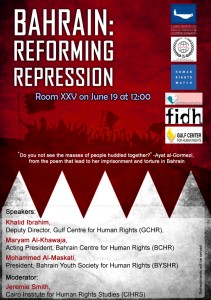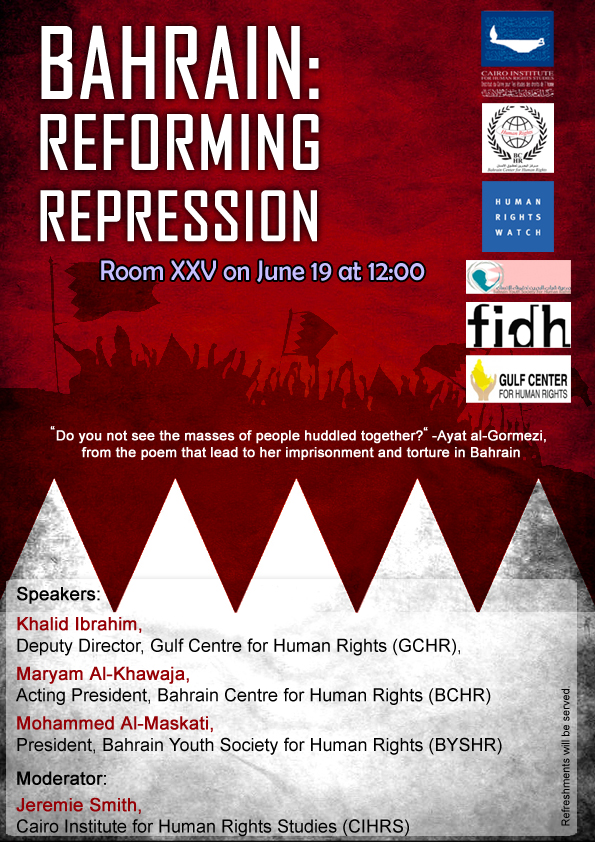 On June 19, 2012, the Cairo Institute for Human Rights Studies (CIHRS), Bahrain Center for Human Rights (BCHR), Gulf Center for Human Rights (GCHR), Bahrain Youth Society for Human Rights (BYSHR), Human Rights Watch (HRW), and International Federation for Human Rights (FIDH) organized a side event entitled “Bahrain: Reforming Repression” as part of the 20th session of the United Nations Human Rights Council (HRC) taking place in Geneva, Switzerland.
On June 19, 2012, the Cairo Institute for Human Rights Studies (CIHRS), Bahrain Center for Human Rights (BCHR), Gulf Center for Human Rights (GCHR), Bahrain Youth Society for Human Rights (BYSHR), Human Rights Watch (HRW), and International Federation for Human Rights (FIDH) organized a side event entitled “Bahrain: Reforming Repression” as part of the 20th session of the United Nations Human Rights Council (HRC) taking place in Geneva, Switzerland.
The speakers at this event included Maryam Al-Khawaja, Acting President of the BCHR, Khalid Ibrahim, Deputy Director of the GCHR, and Mohamed Al-Maskati, President of the BYSHR. The event was moderated by the director of CIHRS’ office in Geneva, Jeremie Smith.
Maryam Al-Khawaja addressed ongoing human rights violations in Bahrain that have taken place after the Bahraini Independent Commission of Inquiry (BICI) submitted its recommendations to the King in November 2011. New, escalating patterns of violence are being used against protesters, while other violations such as arbitrary arrests, night raids, and extrajudicial killings – especially as the result of excessive use of tear gas on residential areas – continue to this day. She noted that the recommendations of the BICI have not been implemented, warning that they have instead been used as a shield to protect the Bahraini government from criticism. She further explained that no one has been held accountable for the crimes documented by the BICI report and referred to the tactic of “show trials” of some low-ranking police officers being used to divert attention from the deeply rooted policy of impunity in the Kingdom.
Khalid Ibrahim addressed the growing trend of targeting human rights defenders in the Gulf region, and specifically in Bahrain. Among the forms of intimidation against human rights defenders he listed were torture, threats, and fabricated legal charges leading to prison sentences. He also shared a testimony from detained prominent Bahraini rights defender Abdul Hadi Al-Khawaja which described the practices of arbitrary arrest, incommunicado detention, psychological and physical torture and sexual harassment, and unfair trial to which he has been exposed. Al-Khawaja is the former president of the BCHR and the co-founder of the GCHR. Like Al-Khawaja, human rights defender Nabeel Rajab, current president of the BCHR, is also presently being held in detention on fabricated charges relating to practicing his rights to free expression and assembly.
Mohammed Al-Maskati expanded the discussion by drawing attention to the government targeting of medical facilities and professionals, including private medical facilities, which has led protestors to avoid seeking medical treatment for their wounds for fear of being arrested or mistreated. Such injuries include gunshot wounds, the effects of tear gas, and injuries sustained as a result of beatings at the hands of security forces. Al- Maskati said, “Between January and June, BYSHR has documented that 480 people sustained shot gun injuries, 25 were beaten and abused by Security Forces, 15 were injured by tear gas canisters. According to our info, only 20% were treated in private hospitals with help of human rights organizations, and the rest were treated at home.”
Finally, Jeremie Smith spoke to the dilemma of implementing the recommendations presented to Bahrain during its recent Universal Periodic Review (UPR), as the Bahraini delegation at the UPR session denied the existence of many violations, such as the detention of political prisoners and restrictions on the media, in the first place. He further alluded to the threats faced by a number of activists following their participation in Bahrain’s UPR last month, raising several concerns on whether authorities in Bahrain possess the genuine political will to implement reforms in the Kingdom.
Smith concluded the 2-hour discussion with a question directed to members of the HRC regarding the obvious double standards used to silence attempts to bring up the human rights situation in Bahrain during the Council’s sessions. He quoted Ayat Al-Qormezi’s poem, which led to her arrest and alleged torture, saying, “I ask member states of this Council and the international community – “Do you not see the masses of people huddled together?” When is the suitable time for you to consider the cries of those who die asking for their freedoms?”
The event was attended by around 35 participants from NGOs, state delegations, and the media. Among the states representatives present were Norway, Switzerland, Netherlands, USA, and Canada
Share this Post

